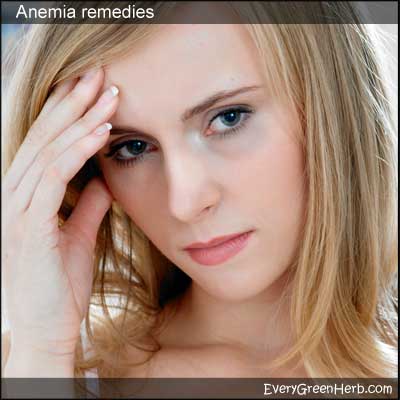Herbs for anemia
Anemia is a common blood disorder that can be treated with herbs and natural remedies.

Herbal green drinks can help treat anemia.
Green drinks with live enzymes are an excellent natural remedy for anemia. Add herbs and vegetables to your diet, whether in green drinks, smoothies, or whole in meals or salads. It really helps!
Increasing iron intake can also help reduce the symptoms of anemia.
Iron enhancing herbs include:
- yellow dock
- red raspberry or wild blackberry leaf
- gentian
- yellowroot
- turmeric
- mullein
- nettle
- parsley
- ginseng
- watercress
- lemon grass
- dandelion
Many times beet root powder, beet juice, bee pollen, and kelp powder can help. All these things are good for you in many ways, so try different remedies when you get the chance.
What is anemia?
Anemia occurs when the number of healthy red blood cells in the body decreases.
Anemia is the most common blood disorder. About 10 percent of North American women develop iron deficient anemia during their childbearing years. Many children and senior citizens also are diagnosed with anemia each year.
Diet can help build up the blood.
One cause of anemia is poor diet. Eating iron rich foods such as liver, figs, dates, dried apricots, seafood, molasses, beets, brown rice, whole grains, poultry, eggs, grapes, raisins, yams, legumes, beans, guava, and mushrooms are very beneficial.
Avoid drinking coffee, tea, beer, or cola with meals as these drinks inhibit the absorption of iron. Manganese rich foods including whole grains, greens, legumes, nuts, pineapple, and eggs help increase iron uptake into the system.
Potassium rich foods including broccoli, bananas, sunflower seeds, vegetables, whole grains, kiwi, and dried fruits should be eaten regularly.
Adding cultured foods like yogurt to the diet helps encourage friendly bacteria that is needed for good digestion. All these things bring health and vitality to the blood.

Vitamin C and folic acid
Citrus, tomato, green pepper, and chives are especially good for anyone with anemia. Some types of anemia benefit from folic acid rich foods including fresh green leafy vegetables, mushrooms, lima beans, black-eyed peas, and kidney beans.
There are many types of anemia.
Although there are over 400 types of anemia, three kinds are most common and include iron deficient anemia, Vitamin B12 deficient anemia, and folic acid deficient anemia. Complications from anemia range from feeling tired to coma and even death.

Symptoms of anemia include weakness and fatigue.
There are many symptoms of anemia including weakness, fainting, heart palpitations, shortness of breath, lack of libido, ulcers, slow healing, fatigue, skin pallor, violent mood swings, irritability, confusion, depression, and seeing spots before the eyes.
Secondary signs of anemia include vision problems, apathy, brittle nails, poor appetite, hair loss, yellowish skin, headaches, dark urine, and poor memory. If you suspect anemia, a simple, inexpensive test can be done at your healthcare provider's office or your local health department.
There are other causes of anemia besides poor diet.
Low immunity, mineral deficiency, pregnancy, rapid growth in childhood, lupus, blood loss, parasites, excessive menstruation, infection, some hereditary conditions, thyroid disease, lead toxicity, and alcoholism are directly related to many cases of anemia.
The frequent use of aspirin, ibuprofen, or other non-steroid anti-inflammatory drugs may also cause anemia.
Anemic individuals should avoid all pesticides and fluorescent lighting.
Minimizing exposure to lead and other toxic metals such as aluminum, cadmium and mercury is also important. If you have been exposed to chemicals, read about removing poisons from the body with herbs.
Avoid foods that keep iron from being absorbed.
Foods and supplements that prevent iron absorption include almonds, cashews, chocolate, kale, rhubarb, sorrel, spinach, Swiss chard, calcium, vitamin E, and zinc. Avoid these things in cases of iron deficient anemia.
Antacids also inhibit iron absorption and should be taken with caution.
For more information about anemia, visit hematology.org.
The opposite of anemia is iron overload.
Known as hemochromatosis, iron overload causes the body to absorb too much iron. Like anemia, hemochromatosis is a serious condition! Read more about herbs and iron overload.
*Always consult with a healthcare professional before taking any herbal remedy or iron supplement especially if you are pregnant, nursing, or taking other medications.
Sources:
https://www.ncbi.nlm.nih.gov/pmc/articles/PMC3746533/
https://opensiuc.lib.siu.edu/cgi/viewcontent.cgi?article=1177&context=ebl
Blessings to you and yours!
Thanks so much for reading my blog. Jan.

*Note - the information on this website has not been evaluated by the Food and Drug Administration.
© 2005-2024 website design and content by Janice Boling